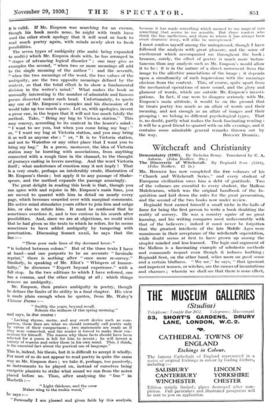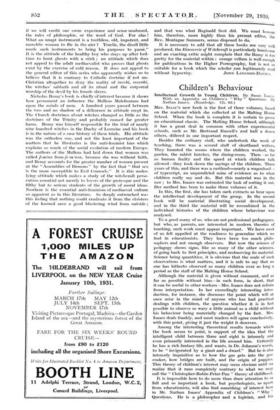Witchcraft and Christianity
Demonolatry (1595). By Nicholas Remy. Translated by E. A., Ashwin. (John Rodker. 30s.) MR. RODKER has now completed the five volumes of his "Church and Witchcraft Series," and every student of European civilization owes hint a debt of gratitude. Two of the volumes are essential to every student, the Malleus Maleficarum, which was the original handbook of' the In- quisition and laid down the rules for the great persecution, and the second of the two books now under review.
Reginald Scot earned himself a small niche in the halls of fame for being the first person to write a book doubting the reality of sorcery. He was a country squire of no great learning, and his writing compares most unfavourably with that of the believers ; indeed it must never be forgotten that the greatest intellects of the late Middle Ages were unanimous in their acceptance of the witchcraft superstition, while doubt seems at first to have grown up among the simpler minded and less learned. The logic and argument of the Malleus is a fascinating example of scholastic methods and commands respect even though it induces loathing ; Reginald Scot, on the other hand, relies more on good sense and a certain bluffness. "We see," he says, "that ignorant and impotent women, or witches, are the causes of incantations and chanties; wherein we shall see that there is none effect, if we will credit our osvne experience and sense unabused, the rules of philosophie, or the word of God. For alas ! What an unapt instrument is a toothless, old, impotent, and unweldie woman to flue in the aier ? Truelie, the divell little needs such instruments to bring his purposes to passe." It is the attitude of the healthy boy who stays up after bed- time to hunt ghosts with a stick ; an attitude, which does not appeal to the adult mediaevalist who proves that ghosts exist by the exercise of cold reason. It does not appeal to the general. editor of this Series who apparently wishes us to believe that it is contrary to Catholic doctrine if not un- Christian altogether to deny the reality of incubi, succubi, the witches' sabbath and all its ritual and the corporeal Worship of the devil by his female slaves.
Nicholas Remy's book is chiefly Of interest because it shows how permanent an influence the Malleus Maleficarum had upon the minds of men. A hundred years passed between the two and no shadow of a difference in attitude crept in. The Church doctrines about witches changed as little as the doctrines of the Trinity and probably caused far greater harm. Remy was himself responsible for the trial of nearly nine hundred witches in the Duchy of Lorraine and his book is' in the nature of a case history of these trials. His attitude was the orthodox one, and not the least important of the matters that he illustrates is the anti-feminist bias which explains so much of the social evolution of modern Europe. The authors of the Malleus had laid down that woman was called Janina from fe-trinus, because she was without faith, and Remy accounts for the greater number of women present at the "Assemblies of Demons" by the fact that " that sex is the more susceptible to Evil Counsels." It is this under- lying attitude which makes a study of the witchcraft perse- cution essential not merely to lovers of the grotesque and the filthy but to serious students of the growth of moral ideas. Nowhere is the essential anti-feminism of mediaeval culture so apparent as in this literature. So deeply entrenched was this feeling that nothing could eradicate it from the cloisters of the learned save a good blustering wind from outside ;
and that was what Reginald Scot did. We must hollow him, therefore, more highly than his present editor, the Rev. Montague Summers, seems disposed to do.
It is necessary to add that all these books are very well produced, the Discorcrie of Witchcraft is particularly handsome and an exacting critic might complain that the Remy is too pretty for the material within : orange vellum is well enough for publications in the Higher Pornography, but is not b0 suitable for a book which the scholar can legitimately read











































 Previous page
Previous page